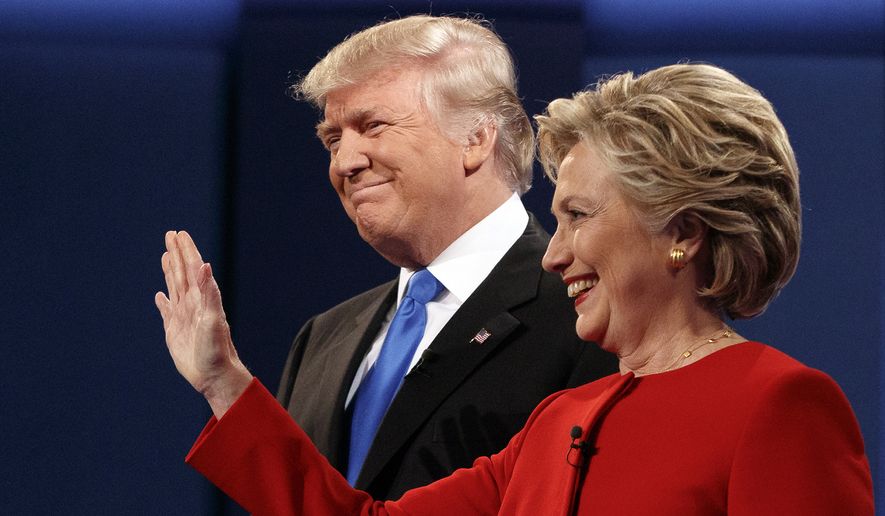Strip away the personalities and their policies, and this year’s election is the epitome of the insider versus the outsider.
On one side is Hillary Clinton, who won her first election to the U.S. Senate thanks to her husband’s political network, then parlayed that into an eight-year tenure in Congress, followed by four years as secretary of state — all at the center of power.
Facing her is Donald Trump, a mostly self-made businessman who has never held elected office, is a novice to politics — and adds more proof of his newcomer status nearly every week on the campaign trail.
For many voters, the Trump stumbles are not only not disqualifying, they are enticing — the proof that he’ll shake things up if voters give him a chance.
“I want to drain the swamp,” said Edward Gato, a retired Army officer, echoing Mr. Trump’s campaign pledge as he cast his ballot during early voting in Florida last month.
For other voters, however, Mr. Trump’s erratic campaign is too much of a risk for them to take, and they’re sticking with the experienced person, flaws and all.
“It’s unknown what his policies would be. That’s the problem,” said Edgar Rodriguez, another early voter. “He’s like Russian roulette.”
The irony is that many of those Democratic voters who are opting for experience this year are the ones who voted for change in 2008, in the form of then-candidate Barack Obama, whose campaign mantra was, literally, “change.”
Now the wind is behind Mr. Trump, who brings far less Washington experience than even Mr. Obama, who had just four years under his belt as a senator when he won the White House.
“The vast majority of the electorate has shown an inclination toward dramatic change,” said Matthew Latimer, a longtime GOP operative who was a speechwriter for President George W. Bush.
He said that dissatisfaction among voters dogged Mrs. Clinton in the primary, when she was almost thwarted by Sen. Bernard Sanders — “a quirky socialist in his seventies.” The same forces, Mr. Latimer said, were at work in the GOP, where more than 70 percent of primary voters supported candidates who said they represented a break from the usual course in Washington.
“Clinton has made little effort to capture that sentiment and instead spent all of her time trying to convince voters that no change is better than a radical one. Whatever Tuesday’s outcome, that will prove a costly mistake,” Mr. Latimer said. “Hers is not a message a fed-up country will accept easily. Nor is it a mandate for her to govern.”
Mrs. Clinton has run a careful campaign, calibrating her positions as needed politically.
Emails hacked from Clinton campaign Chairman John Podesta and posted online by WikiLeaks show her team debating how much “outrage” she needed to show in her 2015 appearance before Congress to testify on Benghazi, and plotting how to flip-flop on her previous support for the Trans-Pacific Partnership. Extensive briefing papers were prepared on everything from why Mrs. Clinton wanted to be president to her position on the labeling of genetically modified crops.
For Mrs. Clinton, being an insider has made it easier to get a glimpse into her life and to evaluate her policies as they’ve changed over time. Voters have seen her change, from backing her husband’s stiff stances toward illegal immigrants and his opposition to same-sex marriage in the White House, to now calling for a broad legalization for illegal immigrants and for transgender Americans to have access to the bathroom of their choice.
By contrast, Mr. Trump at times didn’t seem to know what stances he’d taken. In one primary season debate, he said he wanted to increase visas for high-skilled workers, directly contradicting his campaign pledge to curtail use of the H-1B visa. Hours after the debate, his campaign had to clean up the mess, saying the website position was the right one.
Mr. Trump’s lack of polish comes through in snafus that would have sunk a politician — including calling Mexican migrants rapists, attacking the Muslim parents of a slain Army captain and mocking a disabled reporter.
That’s worried even some of his own voters.
“I don’t like either one. I went for Trump very, very reluctantly, but I think we do need a change, but I really don’t like him,” said Elaine Less, a voter in Mahoning County, Ohio. “He can’t control his mouth. There is just so much that I don’t like about him.”
Analysts debate how much 2016 is really a “change election,” but polls do show a restless electorate tilting toward Mr. Trump’s approach to the campaign.
A September NBC survey asked voters if they wanted a “steady approach” or “major changes to the way government operates even if it is not possible to predict what the changes may be.” Potentially chaotic change beat steady, 49 percent to 47 percent.
“We need change so badly,” Mr. Trump said Saturday, delivering the GOP’s response to Mr. Obama’s weekly radio address. “If we win on Nov. 8, and elect a Republican House and Senate, we can finally deliver the change the American people deserve.”
For Mrs. Clinton, her goal has not been to capture the mantra of being an agent of change, but rather to try to steer it in a direction more to her liking.
“I know that a lot of people say that they want change. Well, let me tell you this: Change is inevitable. There will be change. The question is what kind of change are we going to have,” she said Friday while campaigning in Michigan.
• S.A. Miller, reporting in Florida, and Seth McLaughlin, reporting in Ohio, contributed to this article.
• Stephen Dinan can be reached at sdinan@washingtontimes.com.




Please read our comment policy before commenting.